World News – 2024 – Video Playlist | Video Playlists | Sites: | newsandtimes.org | links-newsandtimes.com | worldwebtimes.com | southcaucasusnews.com | russianworld.net | jossica.com | octobersurprise2016.org | bklyntimes.com | oceanavenuenews.com | fbireform.com | bloggersunite.net | octobersurprise-2024.org | Trump-News.org | Audio-Posts.com | Bklyn-NY.com | Posts Review – newsandtimes.org
Georgetown University sits on a hilltop above the Potomac. Its flagship school, the Edmund A. Walsh School of Foreign Service, trains America’s future diplomats, senior military officers, and intelligence operatives. Its graduates include Bill Clinton and a long list of senators, ambassadors, a CIA director, two White House chiefs of staff, the king of Spain, and various heads of state.
The school also grants degrees to foreign students. I enrolled in its master’s degree program after spending years as a Swedish military officer and diplomat. I was interested in making a career transition from my country’s armed forces, where I’d spent nearly a decade, to diplomatic service. I’d done two tours in Afghanistan, three in Africa, and some diplomatic and commercial work in the Persian Gulf. I wanted to study at one of the world’s premier schools of diplomacy. What I found at Georgetown was far from what I had expected.
First Year
The trouble started with a required course for all students in my program, “Globalization: Inter-Societal Relations.” Georgetown’s course guide describes the class, which was “DEI certified,” as focusing on how European states expanded globally and “the impact of that expansion on peoples with different political and social traditions.” More simply put, this was a class about the negative effects Western expansion had on the peoples of Asia, Africa, and Latin America.
Georgetown solicited online feedback about the course, and I submitted a public review on a Google document set up by school staff for the purpose of collecting student appraisals. I argued that we deserved “a serious history class” focusing on the West, rather than a course that dwelled on the evils of imperialism and colonialism (this line of study has consumed American academia, especially on elite, private school campuses). Diplomats need to understand their own history, I wrote. “In order for you to represent, as a global leader and foreign service officer, you need to know what you represent and why.”
Not a day passed before an anonymous student slapped back at my review, decrying “circumstances where people the most privileged—namely white men—come together to intellectually masturbate to lionized accounts of the West.”
As comments became increasingly heated, school administrators had the whole Google document evaluation taken down. A few days later, the master’s program’s leadership team sent a program-wide email decrying what they said were “racist comments and hurtful responses.” Though my name was not explicitly mentioned, it was widely understood that they were referring to my remarks.
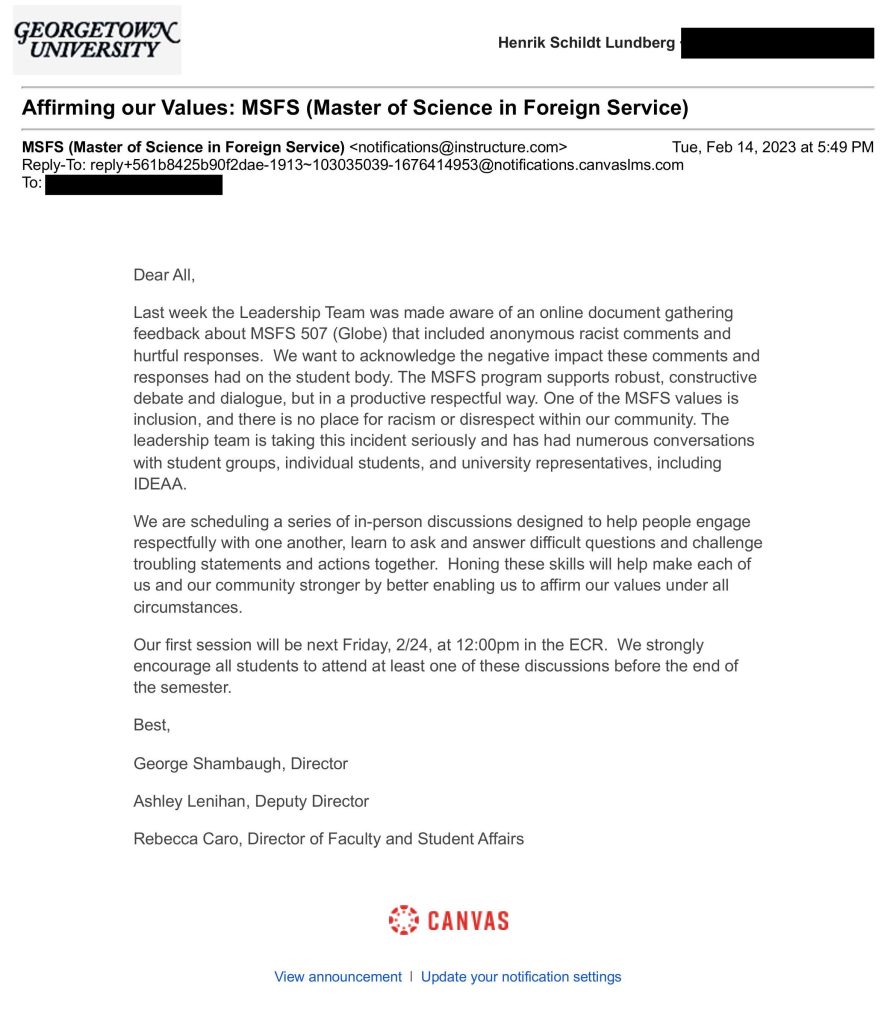
In the wake of that email, I was accused by my fellow students of “ideological rape” and “spiritual genocide.” As a fair-haired Swede with a Northern European accent, I may have been mistaken for a German—attracting the exact kind of prejudice and discrimination my classmates inveighed against. Students I had never met denounced me as a “rapist” when I passed them on campus. My lacrosse stick, which I’d left unattended in the student lounge, was thrown in the trash. A friend, a gay student who was not open about his sexuality, told me students threatened to out him to his parents if he did not denounce our friendship.
On two different occasions on campus, I was slapped on the head by black students whizzing by me on e-scooters, while calling me a “fucking white guy.” There was no point for me to contact the police. During a mandatory “DEI Skills Clinic” led by two faculty members, my fellow first-year students and I had been told not to call the police if we witnessed a person of color committing a crime “because the police are racist.”
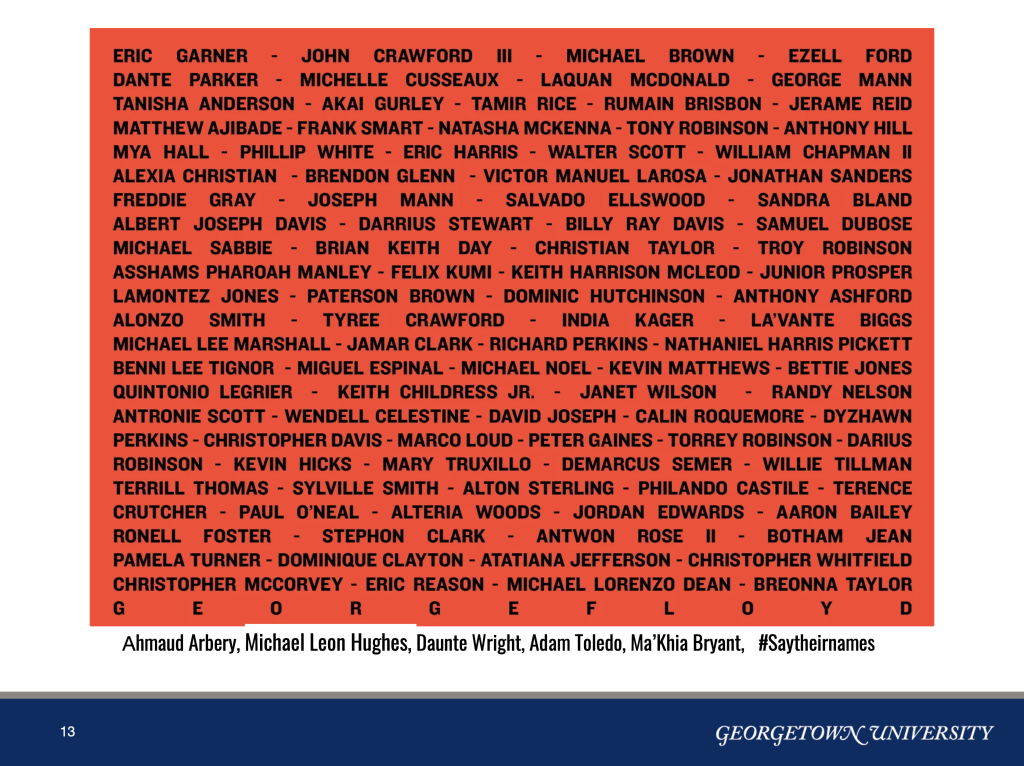
Of all the effronteries I encountered last fall, what hurt me the most was when students discouraged me from attending church because, they warned, it would add to the already widespread perception that I was a Nazi.
As the harassment I was experiencing escalated, I was called to a small meeting with George Shambaugh, the director of the master’s program, and another professor. During our conversation, Shambaugh conceded that the course evaluation I’d written was neither racist nor problematic. But when I asked him if he’d make a public statement to that effect as well as an apology, he refused.
Later, I wrote an email to the School of Foreign Service’s leadership team, telling them they’d created a culture of fear, that students were wary of speaking freely, and that the administrators were suppressing free speech. In response, Shambaugh encouraged me to apologize, saying that my accusations were “offensive.” I ended up apologizing to anyone whose feelings I may have hurt but stood by my statement.
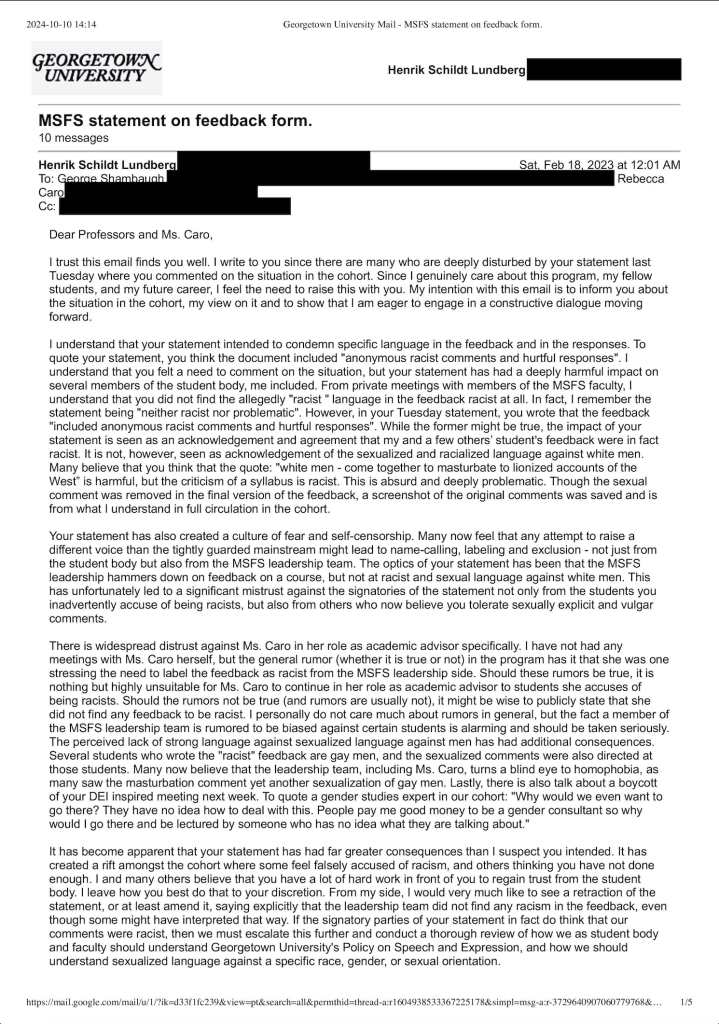
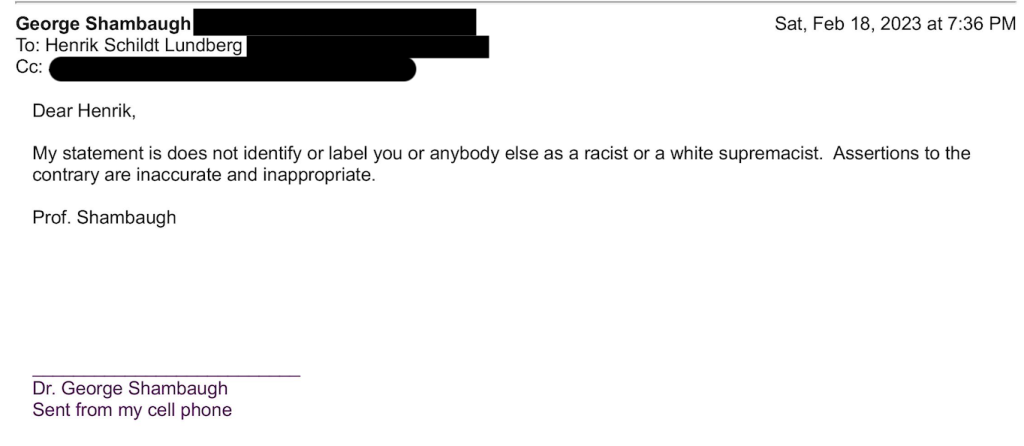
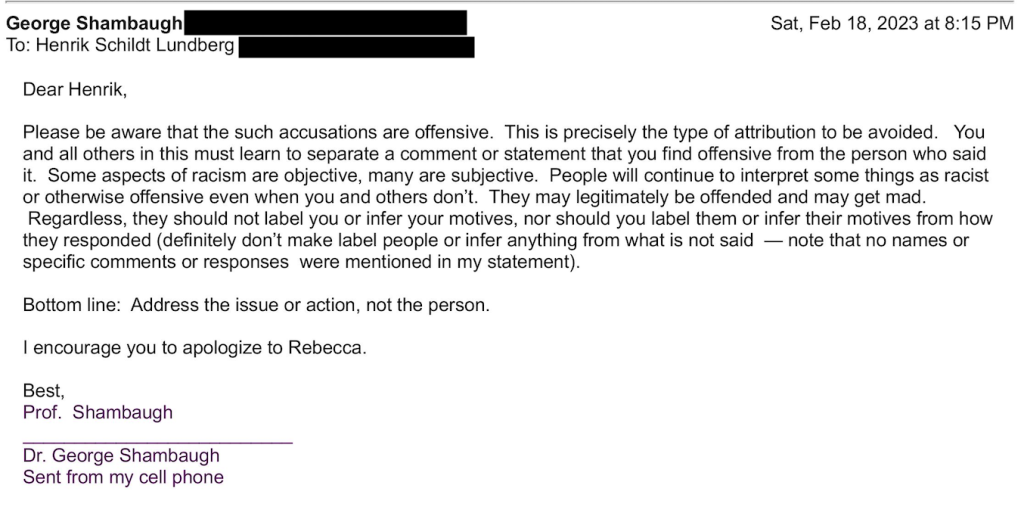
A Georgetown spokesperson declined to comment on “individual student matters” and pointed to the school’s “Speech and Expression Policy.”
“The University is committed to the free and untrammeled exchange of ideas, even when those ideas may be controversial or objectionable to some,” the spokesperson said in a statement. “At the same time, the University condemns hateful expression and conduct that undermines our core values.”
“If any member of the Georgetown community experiences harassment, discrimination, or any other misconduct, the University offers many well-publicized options to report such concerns, receive support, and hold the appropriate community members accountable for any violations of University policy.”
After October 7
As was the case at many academic institutions, the reaction in the fall of 2023 to Hamas’s Oct. 7 attack on Israel caused the simmering tensions about “post-imperialism” and “anticolonialism” to boil over spectacularly. In the days following Oct. 7, a large cohort of my classmates endorsed the attack as a “tangible event” toward decolonization. One student wrote in a widely read WhatsApp group chat that “nothing but violence can remove a violent and heavily equipped colonial regime.” An Oct. 12th event was held to honor “martyrs” who had been “murdered by the occupation and to stand in solidarity with the struggle for Palestinian liberation.”
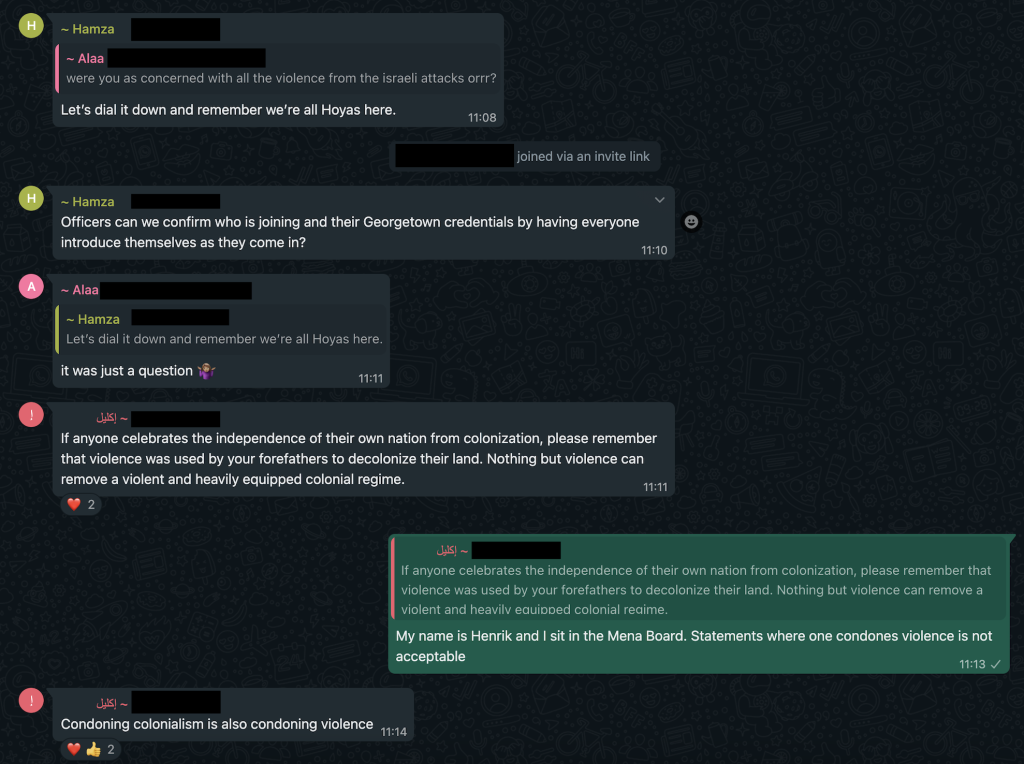
Outside the School of Foreign Service building, students arranged vigils—not for the murdered or kidnapped Jewish victims, but for Palestinian “martyrs.” The walls were covered in posters proclaiming “Glory to our Martyrs” and “Support Liberation.” Georgetown’s chapter of Students for Justice in Palestine, a radical group that has endorsed Hamas, held “Keffiyeh Thursdays” where students wore the checkered headdress that Palestinian terrorists use to conceal their faces.
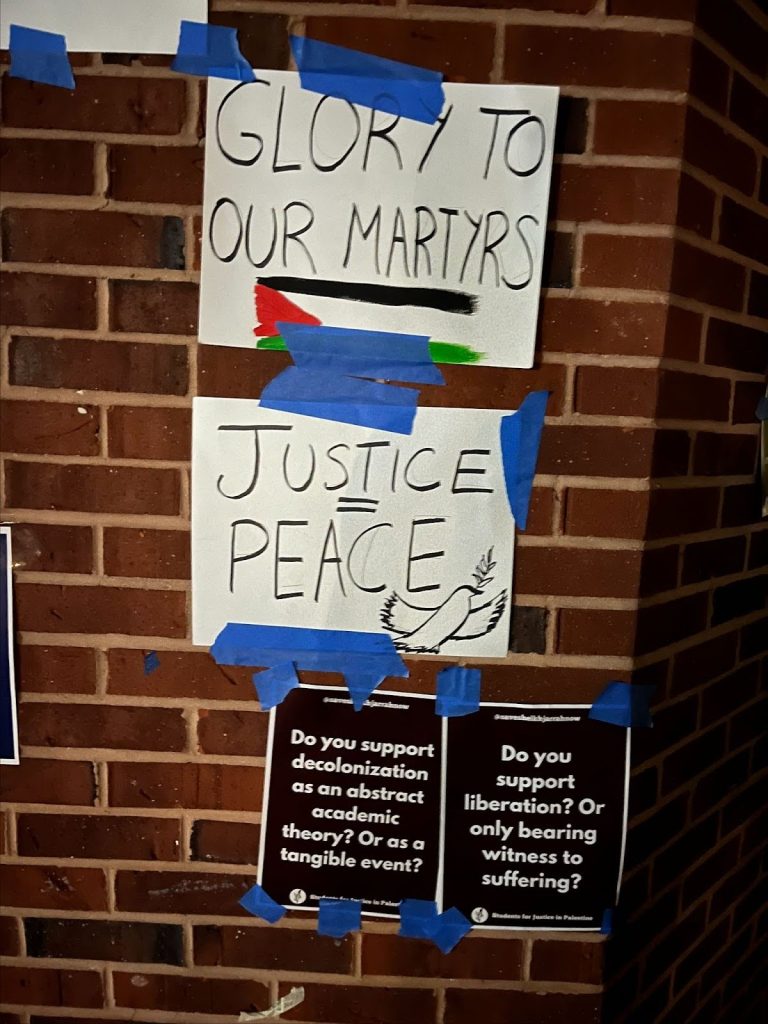
As the size and tenor of the pro-Palestinian protests escalated, Jewish students began fearing for their safety. During a small meeting with some of the School of Foreign Service’s Jewish students held at Georgetown’s Center for Jewish Civilization, Joel Hellman, the dean of the School of Foreign Service, lamented the surge of anti-Semitism on campus but said many of the anti-Israel students’ actions are protected free speech. A senior DEI official at the meeting, Carla Koppell, also said that Jews are not recognized as a “protected” minority group under Georgetown’s DEI policies, but that the school is reviewing the issue (as far as I know, in the tumultuous year that followed, nothing has changed).
I was attending the meeting as a practicing Christian who was concerned about the treatment of my fellow Jewish students. I asked Dean Hellman how he could allow his faculty to call me a racist but hide behind the school’s free speech policies and do nothing when students called for the death of Jews. His response to this was that “the other side is also hurting, and they complain just as much as you.”
The School of Foreign Service announced, a few weeks after the Oct. 7 attack, the hiring of Aneesa Johnson as the “primary point of contact” for masters degree students on “everything academic.” Johnson had a well-documented history of virulently anti-Semitic and anti-Israel remarks—she had denounced so-called Zio bitches and retweeted a cruel meme that showed a Hasidic boy with glasses and braces that said “the world hates you.” A simple Google search of Johnson’s name would have revealed her prolific online opinionating. Only a few days after she started work, Georgetown placed her on leave, claiming they had been unaware of her history.
Around the same time, a recent Muslim convert with a past in the U.S. Armed Forces began posting anti-Semitic content on group WhatsApp chats that were created and moderated by students. When I asked Shambaugh about one of these posts—a cartoon of a Satan-like President Joe Biden, with Stars of David for eyes, amidst burning Palestinian flags—he called it “not even problematic.” He repeated Georgetown’s free speech policy and said the school would remain neutral. A former professor stated that they had warned Shambaugh that his inaction was undoing two decades of work cleaning the campus of its anti-Semites.
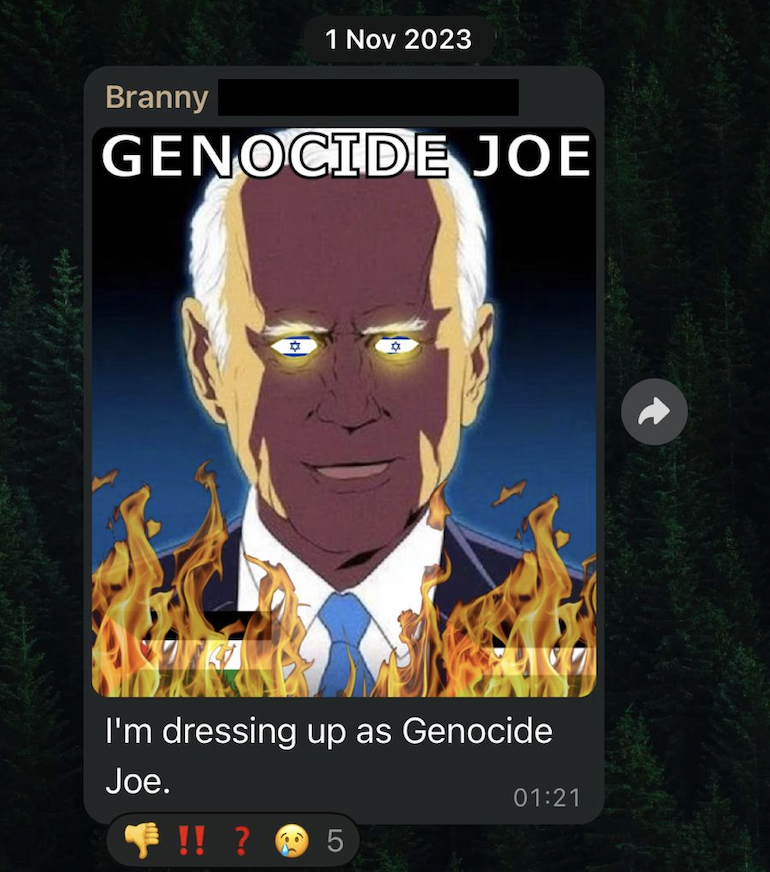
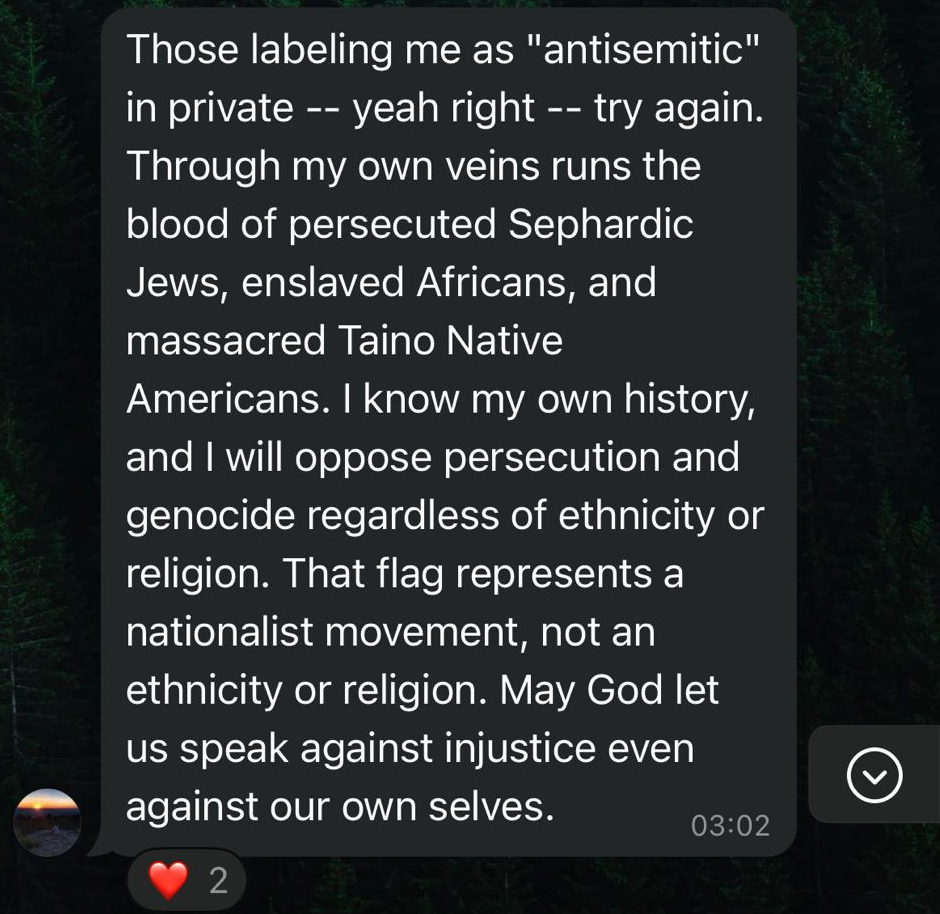
The pervasive anti-Semitism at the School of Foreign Service has unusual significance, when compared to that at other elite schools, in that the school has a direct pipeline to the U.S. diplomatic and national security apparatus. I regularly heard my classmates express their intention to change U.S. policy from within. In early November, the Washington Free Beacon broke the news that my former classmate, Sylvia Yacoub, now a career foreign service officer at the State Department, went rogue and tweeted that Biden was complicit in genocide. Her accusations were hardly a surprise to those who had attended classes with her. During an ethics class taught by a former U.S. military officer, Ms. Yacoub had said that she would use her position at the State Department to change it from within. When I asked if this would be appropriate conduct for a junior foreign service officer, a second student answered: “Progress is messy.”
Then it got worse. My defense of Western heritage continued to bother many of my fellow students. “Don’t die with so much animosity in your heart” wrote a recently converted Muslim menacingly to me on WhatsApp. A School of Foreign Serivce professor who is a terrorism expert advised me, as a friend, to stay at home for a week because “recent converts to Islam with combat skills are likely eager to prove themselves.” I took his advice.
As the protests intensified, not only the student body but also the professoriate ran amok. Georgetown professor John Esposito’s Prince Alwaleed Center for Muslim-Christian Understanding gave a speaking invitation to Mohamad Habehh, a self-proclaimed “PR dude for Hamas” who works for American Muslims for Palestine, an organization which the House Oversight Committee recently investigated for material support for terrorism.
The center also employs Nader Hashemi, a well-documented Hamas supporter whose hiring at Georgetown was internally opposed by many students and faculty but later approved by Dean Hellman himself. Anthropology professor Laurie King called Georgetown’s then-interim director for student life, Rabbi Daniel Shaefer, “a disingenuous fascist who supports the killing of Arabs.” King did not respond to a request for comment.

Several School of Foreign Service master’s degree candidates, many on prestigious Pickering and Rangel fellowships, attended protests on campus and elsewhere in the city. Back on campus in the student lounge, a School of Foreign Service professor knelt in front of some keffiyeh-wearing protesters to offer words of comfort. I was sitting at the table next to them.
In February, the Georgetown Israel Alliance, a pro-Israel student group, organized an event on campus with IDF soldiers. The gathering, which was guarded by armed policemen, could barely begin before it was interrupted by screaming students. Protesters outside the lecture hall had gathered by the hundreds, calling for the death of Israel and Jews. I spoke to a Jewish undergraduate who told me that one protester had threatened to kill him right in front of a police officer, who did nothing in response. I urged him to report the police officer. “To whom? The police officer?” he replied.
At this point, some parents of Jewish students had so little trust in the administration that they began to patrol campus themselves.
I was one of two students invited to meet at Georgetown with the U.S. Special Envoy for Monitoring and Combating Antisemitism, Deborah Lipstadt. The meeting was closed to cameras and its location disclosed just before it took place. Though everyone at the meeting agreed on the moral failure of the school, I was stricken by how willfully the people I paid so much to learn from were at the mercy of rabid anti-Semites.
As a military veteran myself, I proudly waved an IDF flag at graduation in May in support of my brothers and sisters in arms who fight for a land that is as holy to them as it is to me. I found a small seed of consolation in how families from around the world who were attending the commencement united in booing the Hoyas for Hamas who staged a walk-out. The American people, I thought to myself, ultimately will never allow themselves to be ruled by tyrants.
But long after I departed, diploma in hand, the horrors on the Hilltop continue unabated. In September, a Jewish student who was collecting signatures for a letter to the dean condemning anti-Semitism was anonymously attacked online and implicitly encouraged to commit suicide. The letter was intended for the dean of the very best school of international affairs in the world—a school that stands neutral when the nation and the world it once led tremble in the face of anti-Semitism, and the bad actors, including hostile states, who foment it.
The post I Saw How Georgetown’s Prestigious School of Foreign Service Coddles Violent Anti-Semites—Who Are Plotting to Transform US Policy From Within appeared first on .
World News – 2024 – Video Playlist | Video Playlists | Sites: | newsandtimes.org | links-newsandtimes.com | worldwebtimes.com | southcaucasusnews.com | russianworld.net | jossica.com | octobersurprise2016.org | bklyntimes.com | oceanavenuenews.com | fbireform.com | bloggersunite.net | octobersurprise-2024.org | Trump-News.org | Audio-Posts.com | Bklyn-NY.com | Posts Review – newsandtimes.org

